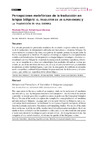Please use this identifier to cite or link to this item:
https://accedacris.ulpgc.es/jspui/handle/10553/76480
| Title: | Percepciones metafóricas de la traducción en lengua búlgara: el traductor es un superhombre y la traducción es una guerra | Other Titles: | Metaphorical perceptions of translation in Bulgarian language: The translator is a superman and translation is a war | Authors: | Baltadzhiyan Vitanova, Elizabeta Eduard | UNESCO Clasification: | 570113 Lingüística aplicada a la traducción e interpretación 570112 Traducción |
Keywords: | Cognitive Sciences Conceptual Metaphor Theory Interpreting Metaphor Translation, et al |
Issue Date: | 2020 | Journal: | Sendebar | Abstract: | This paper presents the main results of an empirical study on the metaphors of translation and interpreting used by Bulgarian translators and interpreters. The theoretical framework is provided by second-generation cognitive sciences, in particular, the Conceptual Metaphor Theory. The aim of the work is to explore the metaphorical conceptualization of translation and interpreting in Bulgarian language and to investigate whether the Bulgarian socio-cultural and political environment has facilitated the emergence of specific metaphors, different from those already analyzed in Translation and Interpreting Studies. The results of the study show, on the one hand, the use of the transfer, travel, art and perception metaphors, which are similar to those collected in earlier translation studies, and, on the other hand, the emergence of metaphors related to the Bulgarian political and cultural life during the socialist era: the metaphors of war and of superman, which may be specific of the Bulgarian culture. Este artículo presenta los principales resultados de un estudio empírico sobre las metáforas de la traducción y la interpretación utilizadas por traductores e intérpretes búlgaros. Su marco teórico lo constituyen las ciencias cognitivas de segunda generación, en particular, la Teoría Conceptual de la Metáfora. El objetivo del trabajo es explorar la conceptualización metafórica de la traducción y la interpretación en lengua búlgara e investigar si el entorno sociocultural y político búlgaro ha propiciado la emergencia de metáforas específicas, diferentes a las ya recogidas en la literatura traductológica. Los resultados del análisis indican, por un lado, un uso de las metáforas del traslado, el viaje, el arte y la percepción, ya analizadas en anteriores estudios traductológicos, y por otro, la emergencia de metáforas relacionadas con la vida política y cultural búlgara durante la época socialista: las de la guerra y el superhombre, que podrían ser específicas de la cultura búlgara. |
URI: | https://accedacris.ulpgc.es/handle/10553/76480 | ISSN: | 1130-5509 | DOI: | 10.30827/SENDEBAR.V31I0.9010 | Source: | Sendebar [ISSN 1130-5509], v. 31, p. 313-333, (Enero 2020) |
| Appears in Collections: | Artículos |
Page view(s)
172
checked on Jan 16, 2026
Download(s)
91
checked on Jan 16, 2026
Google ScholarTM
Check
Altmetric
Share
Export metadata
Items in accedaCRIS are protected by copyright, with all rights reserved, unless otherwise indicated.
